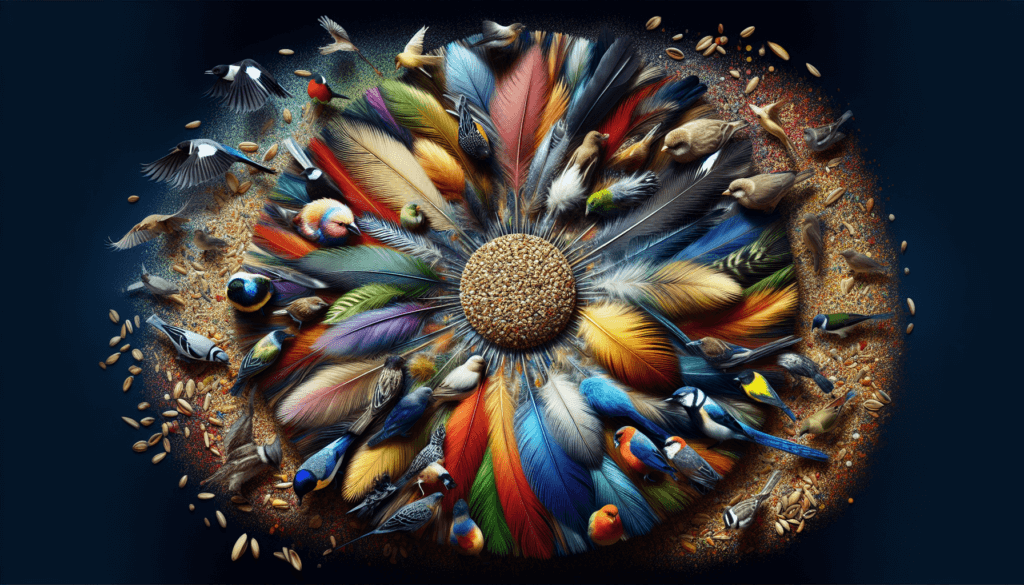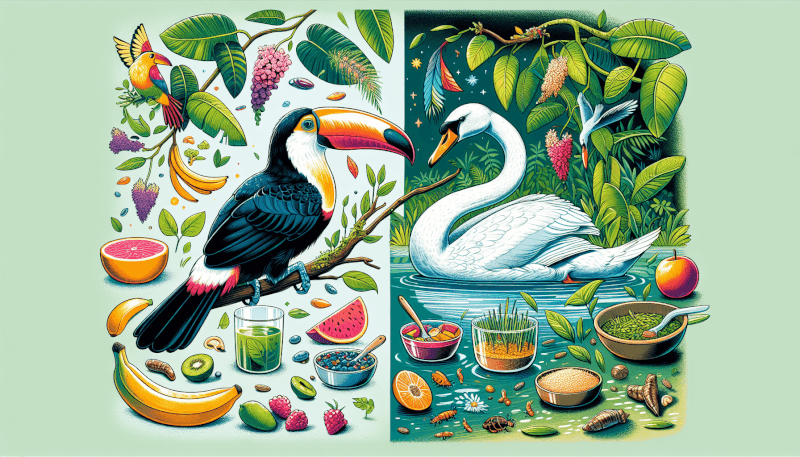Imagine flying through the clear blue sky, soaring effortlessly amidst the beauty of nature. As you glide gracefully, you can’t help but wonder about the important role that a varied and balanced diet plays in the overall health and well-being of birds. Just like humans, birds rely on a diverse and nutritious diet to thrive and stay healthy. But what exactly is the impact of their food choices on their health? In this article, we will explore the fascinating world of avian nutrition and delve into how a varied and balanced diet contributes to the optimal health of our feathered friends.

I. Importance of a Varied and Balanced Diet for Bird Health
A. Introduction to the topic
Feeding our avian friends a varied and balanced diet is crucial for their overall health and well-being. Just like humans, birds require a diverse range of nutrients to thrive. By providing them with a well-rounded diet, we can ensure that they receive all the essential vitamins, minerals, and macronutrients they need. In this article, we will explore the importance of a varied and balanced diet for birds, discuss the nutritional requirements they have, examine the benefits of such a diet, address common diet-related health issues, and provide tips for creating a diet plan that supports optimal bird health.
B. Nutritional requirements of birds
Birds have specific dietary needs that must be met for them to maintain good health. These requirements may vary depending on the species, age, and size of the bird. However, there are some common nutritional components that should be included in their diet.
Proteins are an essential macronutrient for birds as they help build and repair body tissues, feathers, and eggs. Vitamins and minerals play a crucial role in their overall health, supporting various bodily functions, immune system strength, and disease prevention. Carbohydrates provide birds with energy, allowing them to maintain their active lifestyles. Fats are another important energy source and help with insulation, protecting the bird from the cold.
C. Benefits of a varied and balanced diet for birds
Offering a varied and balanced diet to our feathered companions provides numerous benefits. Firstly, it ensures that they receive all the necessary nutrients to maintain optimal health. Different foods contain different vitamins and minerals, so by offering a variety of foods, we increase the chances of birds obtaining all the necessary nutrients. Secondly, a varied diet promotes strong immune systems, making birds less susceptible to diseases and infections. Thirdly, providing a balanced diet helps prevent obesity and malnutrition, common issues that can arise from an unbalanced diet. Lastly, a varied diet adds enrichment to a bird’s life, making mealtime more interesting and enjoyable for them.
II. Components of a Varied and Balanced Diet
A. Seeds and Grains
Seeds and grains are staple components of a bird’s diet. They are a great source of carbohydrates, which provide energy for daily activities. When it comes to choosing seeds and grains, it’s important to opt for high-quality options that are free from mold and pests. Common seeds and grains include sunflower seeds, millet, oats, and flaxseeds. It’s crucial to note that seeds and grains should be provided as part of a balanced diet, as excessive consumption can lead to obesity in some bird species.
B. Fruits and Vegetables
Fruits and vegetables are excellent sources of vitamins, minerals, and fiber for our feathered friends. They add variety to their diet and help prevent vitamin and mineral deficiencies. Some popular options include apples, bananas, oranges, carrots, broccoli, and leafy greens. It’s important to thoroughly wash fruits and vegetables to remove any pesticides or harmful substances that could be present. Adding fresh produce to a bird’s diet can be as simple as cutting them into small, easy-to-handle pieces or incorporating them into homemade bird treats.
C. Insects and Worms
Insects and worms are a natural part of a bird’s diet, especially for those that spend time outdoors. They are an excellent source of protein and can be provided in their natural form or in commercially available dried versions. Mealworms, crickets, and waxworms are popular choices. Avoid collecting insects in areas treated with pesticides, as they can be harmful to birds. It’s also essential to ensure that any insects or worms provided are live or dried and not processed with harmful additives.
D. Pellets and Commercial Diets
Pellets and commercial diets can be a convenient way to ensure that birds receive a balanced nutrition. These diets are formulated specifically for birds and contain a blend of seeds, grains, fruits, vegetables, and other essential nutrients. When purchasing commercial diets, it’s essential to choose high-quality options from reputable brands. Additionally, it’s important not to rely solely on pellet or commercial diets and to incorporate fresh foods into the bird’s diet for added variety and enrichment.

III. Providing the Right Balance
A. Understanding the concept of balance
Providing the right balance in a bird’s diet means offering a variety of foods from different categories while ensuring that the proportions of various nutrients are suitable for the specific bird species. A balanced diet consists of an appropriate ratio of protein, carbohydrates, fats, vitamins, and minerals. Understanding the unique nutritional needs of the bird species you are caring for is essential for achieving this balance.
B. Proper ratios of macronutrients
Macronutrients, including proteins, carbohydrates, and fats, play a crucial role in a bird’s diet. However, the ratios may vary depending on the species. Generally, a healthy diet for most birds consists of approximately 15-20% protein, 40-60% carbohydrates, and 10-15% fat. This balance ensures that the bird receives enough energy and essential nutrients without overloading on any particular macronutrient. Consulting a avian veterinarian or an avian nutritionist can provide valuable guidance on the specific macronutrient ratios required for different bird species.
C. Dietary supplementation
While a varied and balanced diet can meet most of a bird’s nutritional needs, certain species may require additional supplementation. Birds with specific health conditions, breeding pairs, or birds going through growth stages may benefit from targeted dietary supplements. However, it’s crucial to seek professional advice from a veterinarian or avian nutritionist before introducing any supplements. These experts can guide you in selecting appropriate supplements and provide instructions on their correct usage.
IV. Common Diet-Related Health Issues in Birds
A. Vitamin and mineral deficiencies
Inadequate intake of essential vitamins and minerals can lead to various health issues in birds. For example, vitamin A deficiency can cause respiratory problems and skin disorders, while calcium deficiency can lead to weak bones and eggshell abnormalities. Iron, iodine, and vitamin D deficiencies can also have detrimental effects on a bird’s health. Providing a varied diet that includes a range of fruits, vegetables, and nutrient-dense foods can help prevent these deficiencies.
B. Obesity and malnutrition
An imbalanced or monotonous diet can result in both obesity and malnutrition in birds. Obesity can significantly impact a bird’s mobility and overall health, leading to a higher risk of diseases such as diabetes and cardiovascular issues. On the other hand, malnutrition arises when birds are not receiving all the necessary nutrients, often due to an unvaried diet. Ensuring a balanced diet with appropriate proportions of macronutrients and offering a variety of foods can help prevent both obesity and malnutrition.
C. Gastrointestinal disorders
Poor dietary choices can also contribute to gastrointestinal disorders in birds. Seeds, which are commonly offered to birds, can be high in fat, leading to digestive complications. Additionally, a lack of fiber in the diet can cause issues such as constipation and crop impaction. Providing a varied diet that includes fresh fruits, vegetables, and appropriate levels of fiber can help maintain a healthy gut in birds.

V. Creating a Varied Diet Plan for Birds
A. Assessing the nutritional needs of your bird
Before creating a diet plan for your bird, it is essential to assess their specific nutritional needs. Factors such as species, age, size, and any underlying health conditions or sensitivities can affect their requirements. Consulting a veterinarian or avian nutritionist can help determine the ideal diet for your bird and provide guidance on any adjustments that may be necessary.
B. Incorporating a variety of foods
To ensure a varied diet, it is beneficial to offer a wide range of food options to your bird. This includes seeds, grains, fruits, vegetables, insects, and pellets. Rotating these foods and providing different options each day or throughout the week helps prevent boredom and encourages a well-rounded diet. It’s important to introduce new foods gradually, as sudden changes can cause digestive disturbances.
C. Gradual introduction of new foods
When introducing new foods to your bird’s diet, it’s crucial to do so gradually. Birds can be cautious about trying new foods, so introducing them in small amounts, mixed with familiar foods, can help encourage acceptance. Monitor your bird’s response to new foods and gradually increase the amount offered over time. If your bird consistently rejects a particular food, it may be best to try alternative options rather than forcing the issue.
D. Monitoring and adjusting the diet plan
Regular monitoring and adjustment of your bird’s diet plan are essential to ensure it remains balanced and meets their nutritional needs. Keep a close eye on your bird’s weight, feather condition, and overall health. If there are any signs of deficiencies or excesses, consult with a veterinarian or avian nutritionist for guidance on modifying the diet. Additionally, as your bird goes through different life stages or experiences changes in health, adjustments to their diet may be necessary.
VI. Conclusion
A. Recap of the importance of a varied and balanced diet
A varied and balanced diet plays a vital role in the overall health and well-being of birds. It ensures they receive all the necessary nutrients to thrive, supports a robust immune system, and helps prevent common diet-related health issues such as deficiencies or obesity. Providing a wide range of foods, including seeds, grains, fruits, vegetables, insects, and pellets, helps achieve this balance.
B. Key takeaways for optimal bird health
To optimize bird health through their diet:
- Provide a varied diet that includes seeds, grains, fruits, vegetables, insects, and pellets.
- Understand the specific nutritional needs of your bird species and adjust their diet accordingly.
- Aim for a balanced ratio of macronutrients, including proteins, carbohydrates, and fats.
- Monitor and adjust the diet plan based on your bird’s weight, overall health, and life stage.
- Consult with a veterinarian or avian nutritionist for professional guidance and advice.
By following these guidelines and offering a varied and balanced diet, you can contribute to the long and happy life of your feathered companion. Remember, a well-nourished bird is a healthy bird!



